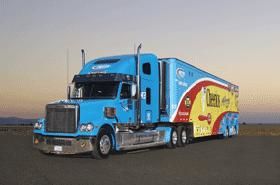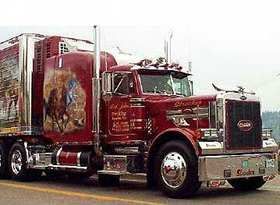Need Advise
Topic 18936 | Page 1

If you love the open road and freedom of OTR , I think you have answered your own question
OTR:
Over The Road
OTR driving normally means you'll be hauling freight to various customers throughout your company's hauling region. It often entails being gone from home for two to three weeks at a time.

Welcome to the forum Francisco.
Sounds like you are a P&D driver (pick-up & delivery). Really tough gig for a rookie driver, consider yourself fortunate that you have managed to avoid any incidents. Good for you. Keep in mind, due to the fact you have less than 1 full year of OTR experience, many of the carriers who will hire you, may require you to go through an abbreviated version of road-training; one-two weeks or so just to help you get your sea legs again. Not really a big deal in the grand scheme of things, might actually be beneficial.
Here is a really good, objective review list to help you make a good choice: Trucking Company Reviews
If you want additional information on a specific carrier, use the search bar found in the upper left hand corner of this page. If for example; you key in the word Schneider and press enter, you will see past threads relevant to Schneider.
Good luck.
OTR:
Over The Road
OTR driving normally means you'll be hauling freight to various customers throughout your company's hauling region. It often entails being gone from home for two to three weeks at a time.
P&D:
Pickup & Delivery
Local drivers that stay around their area, usually within 100 mile radius of a terminal, picking up and delivering loads.
LTL (Less Than Truckload) carriers for instance will have Linehaul drivers and P&D drivers. The P&D drivers will deliver loads locally from the terminal and pick up loads returning to the terminal. Linehaul drivers will then run truckloads from terminal to terminal.
P & D:
Pickup & Delivery
Local drivers that stay around their area, usually within 100 mile radius of a terminal, picking up and delivering loads.
LTL (Less Than Truckload) carriers for instance will have Linehaul drivers and P&D drivers. The P&D drivers will deliver loads locally from the terminal and pick up loads returning to the terminal. Linehaul drivers will then run truckloads from terminal to terminal.

I've had my cdl since August of 2016. In the last 3 months I've done Mostly OTR. Hardly ever had a hard time backing into a dock. Since most of them have a big yard. I took about 1.5 months off. I got a job working a local company picking and delivering mostly LTL or less than a truck load. I sucked in backing specially in Residentials and the yard where we leave trailers, wondering if I need more OTR experience or should I hang with this company, it doesn't pay well and is Union, I'm tempted to go OTR again, I love the road, freedom and drop and hook. I need advice guys here in the forum. Thank you.
You won't do as much backing doing otr, but if it's what you enjoy, I say go for it
CDL:
Commercial Driver's License (CDL)
A CDL is required to drive any of the following vehicles:
- Any combination of vehicles with a gross combined weight rating (GCWR) of 26,001 or more pounds, providing the gross vehicle weight rating (GVWR) of the vehicle being towed is in excess of 10,000 pounds.
- Any single vehicle with a GVWR of 26,001 or more pounds, or any such vehicle towing another not in excess of 10,000 pounds.
- Any vehicle, regardless of size, designed to transport 16 or more persons, including the driver.
- Any vehicle required by federal regulations to be placarded while transporting hazardous materials.
LTL:
Less Than Truckload
Refers to carriers that make a lot of smaller pickups and deliveries for multiple customers as opposed to hauling one big load of freight for one customer. This type of hauling is normally done by companies with terminals scattered throughout the country where freight is sorted before being moved on to its destination.
LTL carriers include:
- FedEx Freight
- Con-way
- YRC Freight
- UPS
- Old Dominion
- Estes
- Yellow-Roadway
- ABF Freight
- R+L Carrier
OTR:
Over The Road
OTR driving normally means you'll be hauling freight to various customers throughout your company's hauling region. It often entails being gone from home for two to three weeks at a time.
Drop And Hook:
Drop and hook means the driver will drop one trailer and hook to another one.
In order to speed up the pickup and delivery process a driver may be instructed to drop their empty trailer and hook to one that is already loaded, or drop their loaded trailer and hook to one that is already empty. That way the driver will not have to wait for a trailer to be loaded or unloaded.

If you have the options, then do whatever makes you happy.
If you're looking for an excuse to go back otr then that is as good as any lol. If backing is the concern then you need to do more backing. That is the only way to get better. If you were decent backing otr then maybe you just haven't acclimated to the new truck.
Good luck
OTR:
Over The Road
OTR driving normally means you'll be hauling freight to various customers throughout your company's hauling region. It often entails being gone from home for two to three weeks at a time.

Hey Francisco, I’ve been in a really similar spot - started with local LTL runs and eventually realized it just wasn’t for me. Tight docks, weird residential stops… it wore me out fast.
What helped me was getting back on the road OTR and using an Trucker Guide app that kind of helped me plan better and avoid the worst spots. It shows good truck stops, places to park - made life way easier, especially early on when I was still figuring things out.
If you’re leaning toward OTR again, something like that might take a lot of the guesswork out of it.
LTL:
Less Than Truckload
Refers to carriers that make a lot of smaller pickups and deliveries for multiple customers as opposed to hauling one big load of freight for one customer. This type of hauling is normally done by companies with terminals scattered throughout the country where freight is sorted before being moved on to its destination.
LTL carriers include:
- FedEx Freight
- Con-way
- YRC Freight
- UPS
- Old Dominion
- Estes
- Yellow-Roadway
- ABF Freight
- R+L Carrier
OTR:
Over The Road
OTR driving normally means you'll be hauling freight to various customers throughout your company's hauling region. It often entails being gone from home for two to three weeks at a time.
New Reply:
New! Check out our help videos for a better understanding of our forum features

















Preview:








 TT On Facebook
TT On Facebook
I've had my cdl since August of 2016. In the last 3 months I've done Mostly OTR. Hardly ever had a hard time backing into a dock. Since most of them have a big yard. I took about 1.5 months off. I got a job working a local company picking and delivering mostly LTL or less than a truck load. I sucked in backing specially in Residentials and the yard where we leave trailers, wondering if I need more OTR experience or should I hang with this company, it doesn't pay well and is Union, I'm tempted to go OTR again, I love the road, freedom and drop and hook. I need advice guys here in the forum. Thank you.
CDL:
Commercial Driver's License (CDL)
A CDL is required to drive any of the following vehicles:
LTL:
Less Than Truckload
Refers to carriers that make a lot of smaller pickups and deliveries for multiple customers as opposed to hauling one big load of freight for one customer. This type of hauling is normally done by companies with terminals scattered throughout the country where freight is sorted before being moved on to its destination.
LTL carriers include:
OTR:
Over The Road
OTR driving normally means you'll be hauling freight to various customers throughout your company's hauling region. It often entails being gone from home for two to three weeks at a time.
Drop And Hook:
Drop and hook means the driver will drop one trailer and hook to another one.
In order to speed up the pickup and delivery process a driver may be instructed to drop their empty trailer and hook to one that is already loaded, or drop their loaded trailer and hook to one that is already empty. That way the driver will not have to wait for a trailer to be loaded or unloaded.